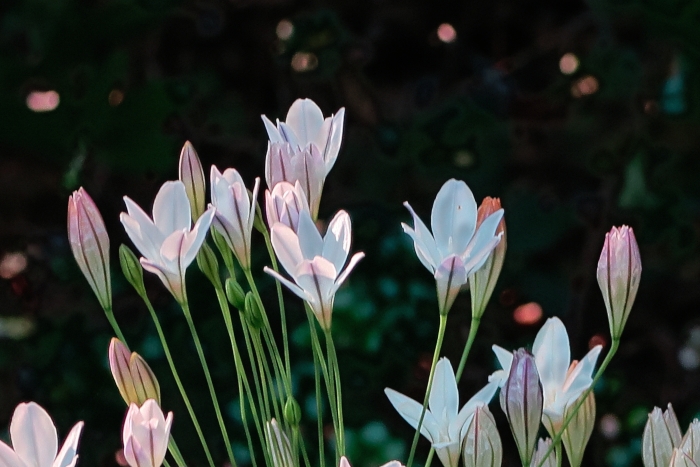Long-Ray Brodiaea
(Triteleia peduncularis)
Long-Ray Brodiaea (Triteleia peduncularis)
/
/

John Rusk
CC BY 2.0
Image By:
John Rusk
Recorded By:
Copyright:
CC BY 2.0
Copyright Notice:
Photo by: John Rusk | License Type: CC BY 2.0 | License URL: https://creativecommons.org/licenses/by/2.0 | Uploader: Tillman | Publisher: Wikipedia Commons |



































Estimated Native Range
Summary
Triteleia peduncularis, commonly known as Long-Ray Brodiaea, is a deciduous perennial herb native to moist meadows, grasslands, and open woodlands in California. It grows from a corm and features two or three basal leaves that can reach up to 40 cm (16 in) in length and 1.5 cm (0.6 in) in width. The plant produces an inflorescence on a smooth, erect stem that can grow up to 80 cm (31 in) tall, topped with an umbel-like cluster of several flowers. Each flower is borne on long, straight pedicels up to 18 cm (7.1 in) long, and the funnel-shaped blooms are white, often with a purple tinge, and consist of six tepals each up to 1.6 cm (0.6 in) long. The stamens have white anthers, and the central ovary is yellow when fresh.
Long-Ray Brodiaea is appreciated for its elegant, star-shaped flowers that add a delicate touch to garden settings. It is suitable for naturalistic plantings, rock gardens, and as a border accent. This plant is relatively low-maintenance, requiring minimal water once established, making it a good choice for drought-tolerant gardens. It thrives in full sun to part shade and prefers well-drained soils. While generally pest-free, it can be susceptible to root rot if overwatered or planted in poorly drained soils. There are no widely known popular cultivars of this species, but its natural form is quite appealing in cultivation.CC BY-SA 4.0
Long-Ray Brodiaea is appreciated for its elegant, star-shaped flowers that add a delicate touch to garden settings. It is suitable for naturalistic plantings, rock gardens, and as a border accent. This plant is relatively low-maintenance, requiring minimal water once established, making it a good choice for drought-tolerant gardens. It thrives in full sun to part shade and prefers well-drained soils. While generally pest-free, it can be susceptible to root rot if overwatered or planted in poorly drained soils. There are no widely known popular cultivars of this species, but its natural form is quite appealing in cultivation.CC BY-SA 4.0
Plant Description
- Plant Type: Herb
- Height: 0.5-1 feet
- Width: 0.15-0.3 feet
- Growth Rate: Moderate
- Flower Color: White
- Flowering Season: Fall, Spring, Summer
- Leaf Retention: Deciduous
Growth Requirements
- Sun: Full Sun, Part Shade
- Water: Medium
- Drainage: Slow, Medium
Common Uses
Drought Tolerant, Edible*Disclaimer: Easyscape's listed plant edibility is for informational use. Always verify the safety and proper identification of any plant before consumption., Low Maintenance, Showy Flowers
Natural Habitat
Moist meadows, grasslands, and open woodlands in California
Other Names
Common Names: Longray Triteleia, Vit Bukettlilja, Long-Rayed Brodiaea
Scientific Names: , Triteleia peduncularis, Brodiaea peduncularis, Triteleia peduncularis var. longipedicellata, Triteleia peduncularis var. trifida, Hookera peduncularis, Milla peduncularis,
GBIF Accepted Name: Triteleia peduncularis Lindl.